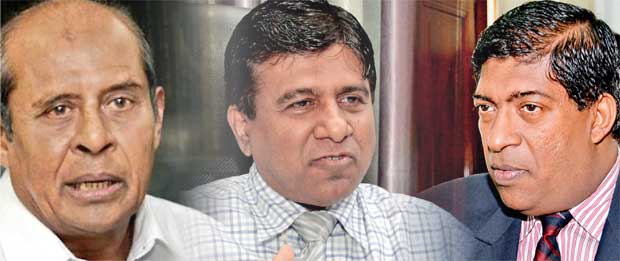Reply To:
Name - Reply Comment

Foreign Affairs Minister Ravi Karunanayake resigned from his Ministerial post on August 10 following pressure exerted by members of his own Government over his seeming connection to the Central Bank bond scam that was exposed during the proceedings of the Presidential Commission inquiring the said scam.
He was replaced by Tilak Marapana, who also resigned as Law and Order Minister 21 months ago after being beleaguered by the members of his own Government over his alleged support to the suspects of an alleged major scandal involving bigwigs of the former Government and the Navy.
Therefore there is every possibility of Karunanayake being reappointed as a Minister in the near future.
The members of the Joint Opposition say that he would be reappointed in three months.
Karunanayake’s resignation on the other hand has brought about a fresh wave of pressure on Justice Minister Wijeyadasa Rajapakshe over his alleged suppression of legal actions against the leaders of the former regime, especially the Mahinda Rajapaksa family. It is a fresh wave of pressure as he was subject to the same pressure by the same elements in his Government over the same allegation in 2015 as well.
A group of Ministers and members of his own Government wanted his head this time through a no-confidence motion, but Prime Minister Ranil Wickremesinghe is said to have prevented them from proceeding with it.
He is a hot topic in the media these days as he is being still criticised by the members of the Government and the civil society organisations that were in the forefront in bringing this Government into power for the delay in bringing the leaders of the former regime to book and his critical remarks against the Hambantota harbour agreement between the Government and a Chinese company. 
Wijeyadasa Rajapakshe’s adversaries seem to be on a strong footing. They are of the view that the investigations and the legal actions against the crimes, frauds and corruption committed by the leaders, members and the officials of the previous Government were moving at a snail’s pace while those against the leaders and members of this Government such as Ravi Karunanayake and Parliamentarian Hirunika Premachandra had been swift.
Wijeyadasa was one of the three ministers of the Yahapalana Government, who had earned the wrath of the members of the same Government and the civil society organisations that called for their resignation.
Marapana and Karunanayake had already resigned whereas Wijeyadasa is still adamant even while challenging the Government unlike the other two.
Marapana and Wijeyadasa were accused in 2015 for defending the suspects of the famous Avant Garde case. Both Ministers who had professional or personal links with the heads of the maritime security company, displaying a conflict of interest argued that the company was not involved in any illegal activity and Wijeyadasa went to the extent of declaring that he would not allow former Defence Secretary Gothabaya Rajapaksa who is also a suspect of the case to be arrested.
Marapana resigned on November 9, 2015, soon after he was challenged by many in the Government as well as the civil society following one of his speeches in the Parliament defending the suspects of the Avant Garde case.
Ravi hanged on to his post until he was reportedly advised by President Maithripala Sirisena and Prime Minister Ranil Wickremesinghe to “create a new tradition in the Parliament” by resigning his post, in the wake of a no-confidence motion against him having been handed over to the Deputy Secretary General of the Parliament.
Wijeyadasa was not prepared to follow suit despite him having defended the Avant Garde suspects and even having openly said that he would not allow the former Defence Secretary to be arrested and his connections with the Avant Garde Chairman Nissanka Senadhipathi having been pictorially proved by the then Democratic Party leader Field Marshal Sarath Fonseka.
Apart from these allegations he has now been accused for the delay in the cases against the leaders of the previous regime and for criticizing a major development strategy of the Government. Then, at what stage of an issue a minister or an official should resign?
How can one say that Ravi created a new tradition or culture by his resignation whereas Marapana did not?
The former was compelled to step down following his controversial evidence before the bond commission that he did not know that Arjun Aloysius, one of the men accused of the bond scam had paid the lease for the penthouse he was occupying, until Mahindananda Aluthgamage told it in the Parliament some time ago. He said he wouldn’t have accepted the luxury house had he known that Aloysius had paid the lease.
If he had resigned due to the guilty consciousness over his acceptance of the penthouse he should have done so when Aluthgamage told it, if in fact he was unaware of it till then.
While boasting that he created a new culture Ravi is also posing questions in a tone “why only me?” which has apparently prompted many in the UNP to hunt for Wijeyadasa. On the other hand he was pressurised to resign for associating with Aloysius by members of his party who were themselves attempting earlier to cover up the bond scam and to defend Aloysius and others allegedly involved in the scam.
In a legal point of view Marapana, Ravi and Wijeyadasa may be innocent, though there may be circumstantial evidence against them.
The former had the right to defend the Avant Garde suspects until they are found guilty by a court of law.
Ravi has a right to live in a house paid by a friend even if the latter is a criminal.
Wijeyadasa despite his challenge that he would not allow Gothabaya Rajapaksa to be arrested says that law takes its course and he did not interfere with it which nobody has thus far factually contested.
But in politics even the seeming conflict of interest and circumstantial evidence matter a lot.
Marapana resigned taking the responsibility of his speech which defended Avant Garde suspects and now he has been appointed a minister again. Nobody, including those who wanted his head 21 months ago, did not oppose his new appointment.
Does it mean that his moral culpability that forced him to resign has expired?
If so, how long one who has resigned his ministerial post has to wait to be reappointed, unchallenged?
Or did his moral culpability lie in holding only the portfolio he had held when he resigned? Ravi, more than others, might be interested in knowing the answers.
Whatever the answers for these questions may be, the fact remains that Marapana resigned after being accused of defending corrupt people, but replaced another one who had also been accused of being associated with some other corrupt people. Resignation of a person from a post is deemed as a voluntary act of repentance. But what really happens on the ground is that people resign only when their misdeeds are exposed, while attempting to take moral high ground as well for their resignations.
Politicians and high ranking officials are not normally sacked for their crimes or misdeeds but asked to resign, whereas the case with the low ranking officials is the other way around.